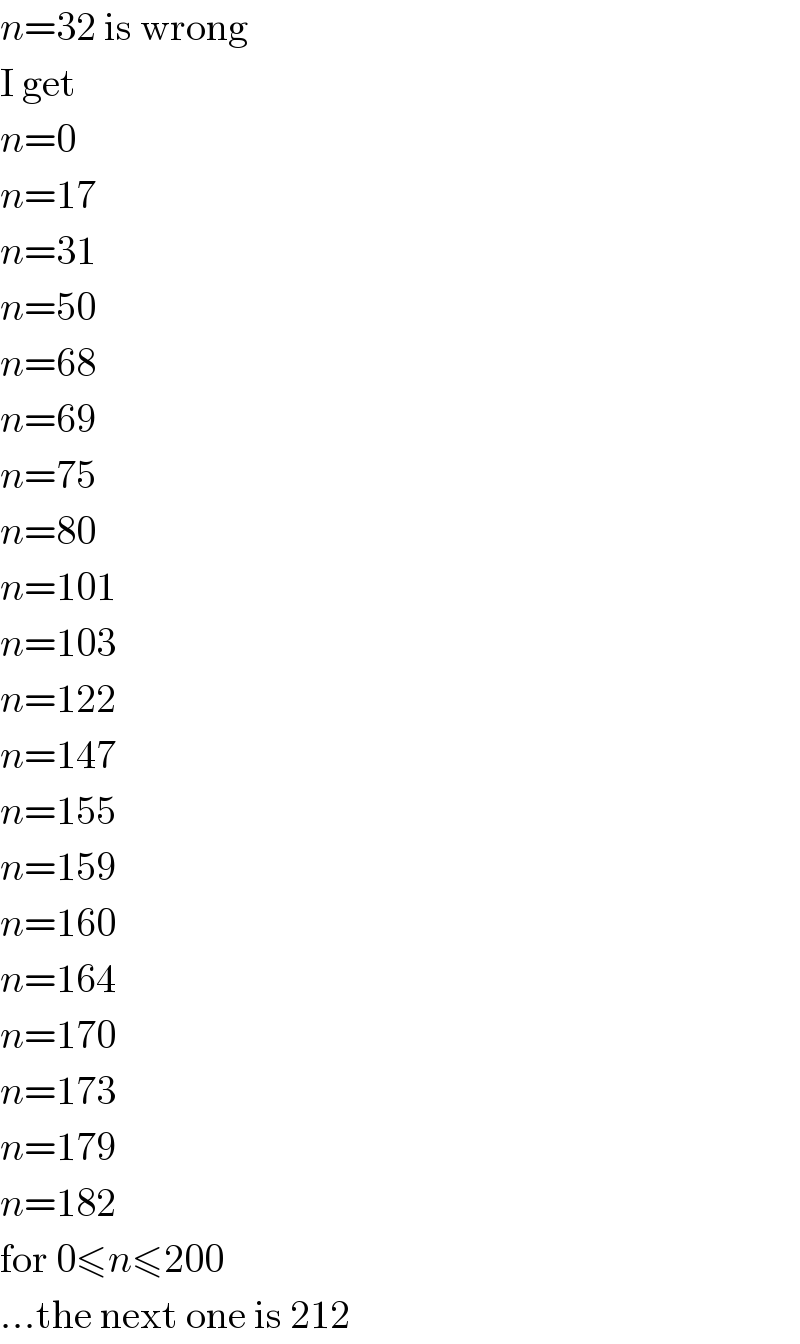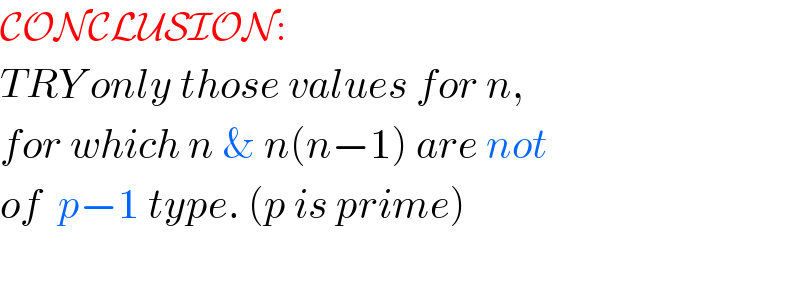
Question Number 60808 by naka3546 last updated on 26/May/19

$${Prove}\:\:{or}\:\:{disprove}\:\:{that}\:\:{there}\:\:{is} \\ $$$${a}\:\:{positive}\:\:{integer}\:\:{suitable}\:\:{for} \\ $$$$\:\:\:\:\:\:\:{n}^{\mathrm{3}} \:+\:\mathrm{1}\:\:\:\mid\:\:\:{n}!\:\:\:\:\:\:\:\:\:\:\:\:\:\:\:\:\:\:\left(\:\:{n}!\:\:\:{is}\:\:{divided}\:\:{by}\:\:{n}^{\mathrm{3}} \:+\:\mathrm{1}\:\:\right) \\ $$$${n}\:\:\in\:\:\mathbb{Z}^{+} \\ $$
Commented by mr W last updated on 26/May/19

$${the}\:{first}\:{one}\:{is}\:{n}=\mathrm{17}: \\ $$$${n}!=\mathrm{355687248096000} \\ $$$${n}^{\mathrm{3}} +\mathrm{1}=\mathrm{4914} \\ $$$${n}!\:{mod}\:\left({n}^{\mathrm{3}} +\mathrm{1}\right)=\mathrm{0} \\ $$
Commented by mr W last updated on 26/May/19

$${i}\:{found}\:{the}\:{next}\:{one}:\:{n}=\mathrm{31} \\ $$$${n}!=\mathrm{8222838654177922817725562880000000} \\ $$$${n}^{\mathrm{3}} +\mathrm{1}=\mathrm{29792} \\ $$$${n}!\:{mod}\:\left({n}^{\mathrm{3}} +\mathrm{1}\right)=\mathrm{0} \\ $$
Commented by mr W last updated on 26/May/19

$${the}\:{next}\:{one}\:{is}\:{n}=\mathrm{32} \\ $$
Commented by naka3546 last updated on 26/May/19

$${how}\:\:{to}\:\:{get}\:\:{them},\:\:{sir}? \\ $$
Commented by mr W last updated on 26/May/19

$${there}\:{is}\:{no}\:{intelligent}\:{way}\:{but}\:{trying} \\ $$$${one}\:{after}\:{one}. \\ $$
Commented by MJS last updated on 27/May/19

$${n}=\mathrm{32}\:\mathrm{is}\:\mathrm{wrong} \\ $$$$\mathrm{I}\:\mathrm{get} \\ $$$${n}=\mathrm{0} \\ $$$${n}=\mathrm{17} \\ $$$${n}=\mathrm{31} \\ $$$${n}=\mathrm{50} \\ $$$${n}=\mathrm{68} \\ $$$${n}=\mathrm{69} \\ $$$${n}=\mathrm{75} \\ $$$${n}=\mathrm{80} \\ $$$${n}=\mathrm{101} \\ $$$${n}=\mathrm{103} \\ $$$${n}=\mathrm{122} \\ $$$${n}=\mathrm{147} \\ $$$${n}=\mathrm{155} \\ $$$${n}=\mathrm{159} \\ $$$${n}=\mathrm{160} \\ $$$${n}=\mathrm{164} \\ $$$${n}=\mathrm{170} \\ $$$${n}=\mathrm{173} \\ $$$${n}=\mathrm{179} \\ $$$${n}=\mathrm{182} \\ $$$$\mathrm{for}\:\mathrm{0}\leqslant{n}\leqslant\mathrm{200} \\ $$$$...\mathrm{the}\:\mathrm{next}\:\mathrm{one}\:\mathrm{is}\:\mathrm{212} \\ $$
Commented by MJS last updated on 27/May/19

$$\mathrm{btw} \\ $$$$\left({n}^{\mathrm{3}} +\mathrm{1}\right)\mid{n}!\:\Leftrightarrow\:\left({n}^{\mathrm{3}} −\mathrm{1}\right)\mid\left({n}−\mathrm{1}\right)! \\ $$
Commented by mr W last updated on 28/May/19

$${thanks}\:{sir}! \\ $$$${you}\:{are}\:{right},\:\mathrm{32}\:{is}\:{wrong}. \\ $$
Answered by Rasheed.Sindhi last updated on 28/May/19
![Trying to make search narrower n^3 + 1 ∣ n! (n+1)(n^2 −n+1) ∣ n! n+1 ∣ n! ∧ n^2 −n+1 ∣ n! [ ab ∣ c ⇒a∣c & b∣c ] • n+1 ∣ n! ⇒ n+1 ∉ P [ Any prime>n can′t divide n! ] n≠2−1,3−1,5−1,....... n≠1,2,4,6,10,12,16,18,...... n may be 3,5,7,8,9,11,13,14,15,17 • n^2 −n+1 ∣ n! c1:n^2 −n+1<n n^2 −2n+1<0 (n−1)^2 <0 Impossible c2: n^2 −n+1=n n=1 doesn′t satisfy n^3 +1 ∣ n! c3: n^2 −n+1>n (n−1)^2 >0 the only considerable case n^2 −n+1>n ∧ n^2 −n+1 ∣ n! ⇒ n^2 −n+1 ∉ P So n+1 & n^2 −n+1 both are not prime Hence such values of n for which these two expressions are prime value must be excluded from considering. (Sample) determinant ((n,(n+1),(n^2 −n+1),(rem)),(1,( 2^∗ ),( 1),( ×)),(2,( 3^∗ ),( 3^∗ ),( ×)),(3,( 4),( 7^∗ ),( ×)),(4,( 5^∗ ),( 13^∗ ),( ×)),(5,( 6),( 21),( −)),(6,( 7^∗ ),( 31^∗ ),( ×)),(7,( 8),( 43^∗ ),( ×)),(8,( 9),( 57),( −)),(9,( 10),( 73^∗ ),( ×)),((10),( 11^∗ ),( 91),( ×)),((11),( 12),( 121),( −)),((12),( 13^∗ ),( 133),( ×))) × means excluded − means considerable numbers starred are prime.](Q60942.png)
$${Trying}\:{to}\:{make}\:{search}\:{narrower} \\ $$$$\:\:\:\:\:\:\:{n}^{\mathrm{3}} \:+\:\mathrm{1}\:\:\:\mid\:\:\:{n}!\:\:\:\:\: \\ $$$$\:\:\:\:\:\:\left({n}+\mathrm{1}\right)\left({n}^{\mathrm{2}} −{n}+\mathrm{1}\right)\:\:\:\mid\:\:\:{n}! \\ $$$$\:\:\:\:{n}+\mathrm{1}\:\mid\:{n}!\:\:\:\wedge\:\:{n}^{\mathrm{2}} −{n}+\mathrm{1}\:\mid\:\:{n}!\:\:\left[\:{ab}\:\mid\:{c}\:\Rightarrow{a}\mid{c}\:\&\:{b}\mid{c}\:\right]\: \\ $$$$ \\ $$$$\:\bullet\:\:{n}+\mathrm{1}\:\:\mid\:\:{n}!\:\Rightarrow\:{n}+\mathrm{1}\:\notin\:\:\mathbb{P} \\ $$$$\:\:\:\:\:\left[\:{Any}\:{prime}>{n}\:{can}'{t}\:{divide}\:{n}!\:\right] \\ $$$${n}\neq\mathrm{2}−\mathrm{1},\mathrm{3}−\mathrm{1},\mathrm{5}−\mathrm{1},....... \\ $$$${n}\neq\mathrm{1},\mathrm{2},\mathrm{4},\mathrm{6},\mathrm{10},\mathrm{12},\mathrm{16},\mathrm{18},...... \\ $$$${n}\:{may}\:{be}\:\mathrm{3},\mathrm{5},\mathrm{7},\mathrm{8},\mathrm{9},\mathrm{11},\mathrm{13},\mathrm{14},\mathrm{15},\mathrm{17} \\ $$$$ \\ $$$$\:\bullet\:\:{n}^{\mathrm{2}} −{n}+\mathrm{1}\:\mid\:\:{n}! \\ $$$$\:\:\:\:\:\:{c}\mathrm{1}:{n}^{\mathrm{2}} −{n}+\mathrm{1}<{n} \\ $$$$\:\:\:\:\:\:\:\:\:\:\:\:{n}^{\mathrm{2}} −\mathrm{2}{n}+\mathrm{1}<\mathrm{0} \\ $$$$\:\:\:\:\:\:\:\:\:\:\:\:\left({n}−\mathrm{1}\right)^{\mathrm{2}} <\mathrm{0}\:\:\:\:\:{Impossible} \\ $$$$\:\:\:\:\:{c}\mathrm{2}:\:{n}^{\mathrm{2}} −{n}+\mathrm{1}={n} \\ $$$$\:\:\:\:\:\:\:\:\:\:\:{n}=\mathrm{1}\:\:{doesn}'{t}\:{satisfy}\:{n}^{\mathrm{3}} +\mathrm{1}\:\mid\:{n}! \\ $$$$\:\:\:\:\:{c}\mathrm{3}:\:{n}^{\mathrm{2}} −{n}+\mathrm{1}>{n}\: \\ $$$$\:\:\:\:\:\:\:\:\:\:\:\:\left({n}−\mathrm{1}\right)^{\mathrm{2}} >\mathrm{0}\:\:\:\:{the}\:{only}\:{considerable}\:{case} \\ $$$$\:\:\:\:\:{n}^{\mathrm{2}} −{n}+\mathrm{1}>{n}\:\:\wedge\:\:{n}^{\mathrm{2}} −{n}+\mathrm{1}\:\mid\:{n}! \\ $$$$\:\:\:\:\:\:\Rightarrow\:\:{n}^{\mathrm{2}} −{n}+\mathrm{1}\:\notin\:\mathbb{P} \\ $$$$\:{So}\:{n}+\mathrm{1}\:\&\:\:{n}^{\mathrm{2}} −{n}+\mathrm{1}\:{both}\:{are}\:{not}\:{prime} \\ $$$${Hence}\:{such}\:{values}\:{of}\:{n}\:{for}\:{which}\:{these} \\ $$$${two}\:{expressions}\:{are}\:{prime}\:{value}\:{must} \\ $$$${be}\:{excluded}\:{from}\:{considering}. \\ $$$$\left(\mathcal{S}{ample}\right) \\ $$$$\begin{vmatrix}{{n}}&{{n}+\mathrm{1}}&{{n}^{\mathrm{2}} −{n}+\mathrm{1}}&{{rem}}\\{\mathrm{1}}&{\:\:\:\mathrm{2}^{\ast} }&{\:\:\:\:\:\:\:\:\:\mathrm{1}}&{\:\:\:×}\\{\mathrm{2}}&{\:\:\:\mathrm{3}^{\ast} }&{\:\:\:\:\:\:\:\:\:\mathrm{3}^{\ast} }&{\:\:\:×}\\{\mathrm{3}}&{\:\:\:\mathrm{4}}&{\:\:\:\:\:\:\:\:\:\mathrm{7}^{\ast} }&{\:\:\:×}\\{\mathrm{4}}&{\:\:\:\mathrm{5}^{\ast} }&{\:\:\:\:\:\:\:\:\mathrm{13}^{\ast} }&{\:\:\:×}\\{\mathrm{5}}&{\:\:\:\mathrm{6}}&{\:\:\:\:\:\:\:\:\mathrm{21}}&{\:\:\:−}\\{\mathrm{6}}&{\:\:\:\mathrm{7}^{\ast} }&{\:\:\:\:\:\:\:\:\mathrm{31}^{\ast} }&{\:\:\:×}\\{\mathrm{7}}&{\:\:\:\mathrm{8}}&{\:\:\:\:\:\:\:\:\mathrm{43}^{\ast} }&{\:\:\:×}\\{\mathrm{8}}&{\:\:\:\:\mathrm{9}}&{\:\:\:\:\:\:\:\mathrm{57}}&{\:\:\:−}\\{\mathrm{9}}&{\:\:\:\mathrm{10}}&{\:\:\:\:\:\:\mathrm{73}^{\ast} }&{\:\:\:×}\\{\mathrm{10}}&{\:\:\:\mathrm{11}^{\ast} }&{\:\:\:\:\:\:\mathrm{91}}&{\:\:\:×}\\{\mathrm{11}}&{\:\:\:\mathrm{12}}&{\:\:\:\:\:\mathrm{121}}&{\:\:\:−}\\{\mathrm{12}}&{\:\:\:\mathrm{13}^{\ast} }&{\:\:\:\:\:\mathrm{133}}&{\:\:\:\:×}\end{vmatrix} \\ $$$$×\:{means}\:{excluded} \\ $$$$−\:{means}\:{considerable} \\ $$$${numbers}\:{starred}\:{are}\:{prime}. \\ $$
Commented by Rasheed.Sindhi last updated on 28/May/19

$$\mathcal{CONCLUSION}: \\ $$$${TRY}\:{only}\:{those}\:{values}\:{for}\:{n}, \\ $$$${for}\:{which}\:{n}\:\&\:{n}\left({n}−\mathrm{1}\right)\:{are}\:{not} \\ $$$${of}\:\:{p}−\mathrm{1}\:{type}.\:\left({p}\:{is}\:{prime}\right) \\ $$$$ \\ $$
Commented by mr W last updated on 29/May/19

$${thanks}\:{alot}\:{sir}! \\ $$
